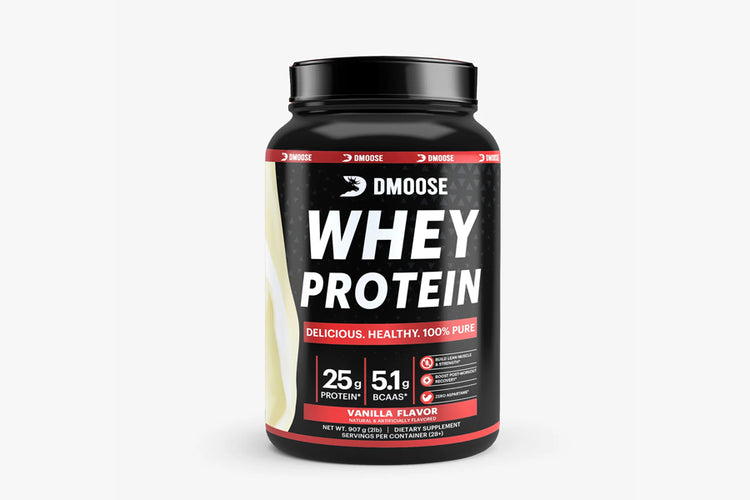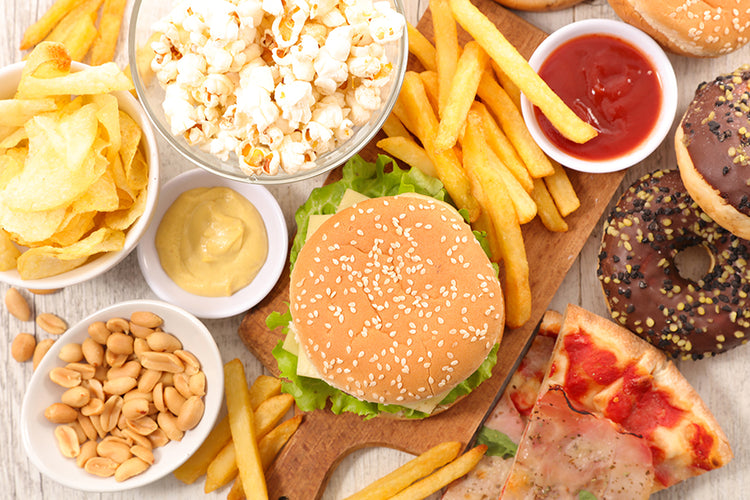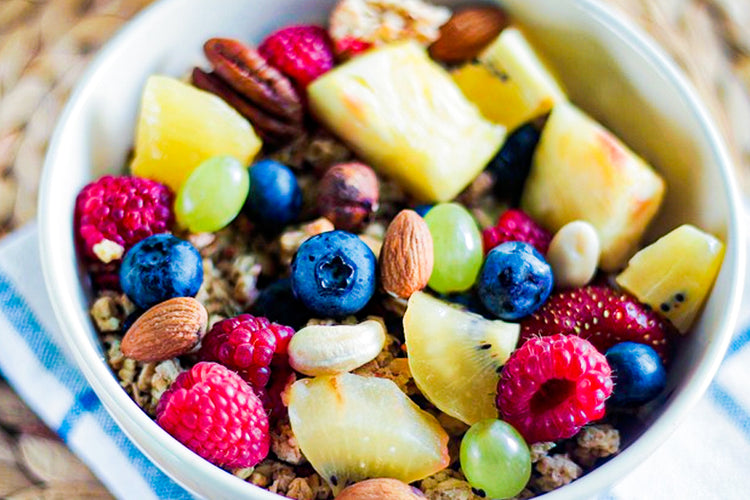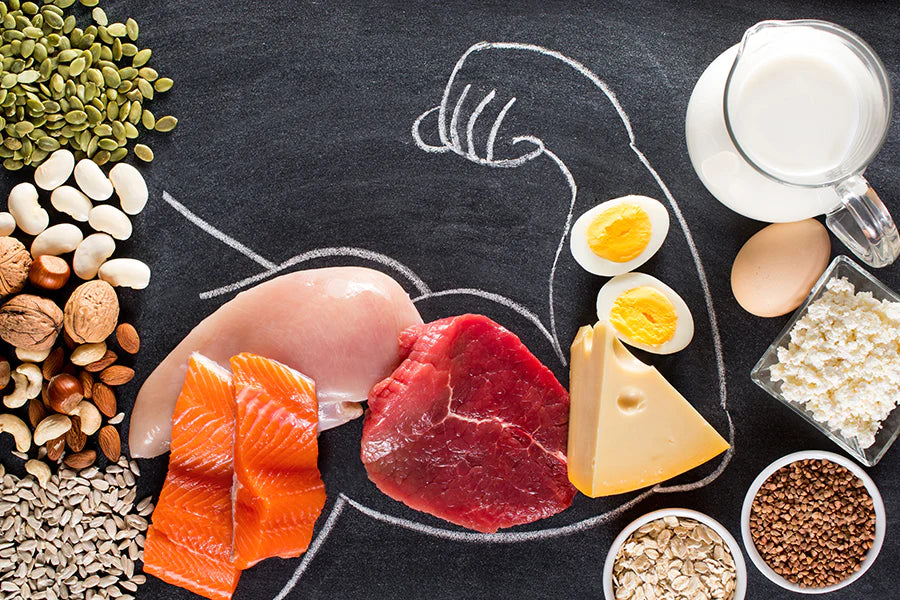We've all been there - stumbling out of the gym feeling like a shaky, sore mess. The culprit? Muscle soreness is the most common post-workout complaint.
Blame it on overtraining or other injuries, but one thing's for sure: the right fuel can work wonders in repairing your aching muscles and easing your pain. Time to chow down and bounce back like a boss!
Food is more than just workout fuel! It's the key to getting the vitamins and minerals you need to bounce back from those sessions. Eat smart and recover like a champ! Dr. Stacy Sim, Exercise Physiologist & Nutrition Scientist at Stanford University School of Medicine, said:
Nutrition is a critical component of achieving optimal health and performance. With proper nutrition, your body can repair muscle damage, reduce post-exercise soreness and fatigue, and recover efficiently from exercise. ~Dr. Stacy Sims
So, let not muscle soreness slow you down! Our expertly-curated list of muscle-recovery foods and consumption tips will give you the post-workout boost you need. This blog will examine the science behind muscle soreness and show you how to eat your way to a more robust, faster you. So, let's dig in!
What Is Muscle Soreness?

You know that feeling when walking up stairs feels like climbing a mountain? That's muscle soreness, my friend. Blame it on those tiny tears in your muscles that happen during exercise.
But fear not; they typically heal within 24 hours, but occasionally you can feel like you were hit by a truck for up to a week afterwards. So, let's embrace the pain and keep pumping iron, shall we?
The next thing is how to spot soreness. So, the symptoms may include pain, stiffness, and inflammation. But fear not; treatment usually includes rest, icing the affected area, and popping over-the-counter meds. Physical therapy can also be beneficial in certain situations.
But are sore muscles making you regret that workout? Fear not! Warming up before exercising, cooling down afterward, stretching regularly, and staying hydrated can help prevent discomfort.
And guess what? Certain foods reduce muscle soreness, so you can go hard at the gym without worrying about the aftermath. Time to get fit and feast!
Out of many in the market, why not opt for DMoose Post Workout Powder, which is not merely a post-workout but offers bounteous benefits starting from muscle recovery to muscle gains and pumping? It will keep your soreness at bay and let you enjoy your workout without any sickness breaks.
How Do Foods Help With Muscle Recovery?
You may have heard that specific foods can assist in easing muscle soreness. But what exactly are muscle recovery foods? And what makes them so effective? Just as muscles need the right fuel pre-workout to perform at their best, they also need the proper nutrients post-workout to repair and grow.
That's where muscle recovery foods come in. After an exercise, eating the appropriate meals can help decrease muscle discomfort, increase energy, and encourage repair and growth.
The efficiency of any training plan can be increased by eating meals that assist your body in recuperating from strenuous exercise. These foods also provide the nutrients necessary for building lean muscle, allowing you to go hard at any fitness activity without feeling tired after each workout.
Essential Nutrients for Muscle Recovery

Get ready to feast like a muscle-building warrior! Take in plenty of the vital nutrients your body requires to support your recovery. Think proteins, amino acids, and all the good stuff your muscles crave. Your body will appreciate you for it, so trust us.
Protein
Want those muscles to grow like weeds in a garden? Then listen up, folks! After working out, get your protein fix at the nearest chicken coop, fishery, or beef factory. Vegan? No problem, tofu can do the trick, and let's remember our feathery friends for some protein-packed eggs. Please don't skip the protein; it's vital for muscle growth and repair.
Carbohydrates
Let's talk about the unsung hero of muscle recovery: CARBS! These bad boys help restore those glycogen stores that take a hit during exercise.
Good sources of this vital nutrient include fruits, veggies, whole grains, and legumes. Give your muscles some carb love; you won't regret it!
Omega-3 Fatty Acids
Don't let inflammation slow down your gains! Omega-3 fatty acids are essential for your muscles - they fight inflammation and minimize soreness. Get your omega-3 fix from delicious fish sources like salmon, tuna, mackerel, and sardines. Say goodbye to achy muscles and hello to gains!
Antioxidants
Say goodbye to free radicals! These sneaky molecules love to wreak havoc on our cells, causing inflammation and damage. But fear not, dear friends. Antioxidants are here to save the day! Antioxidants like fruits, veggies, green tea, and dark chocolate protect cells from harm. Who knew protecting your health could be so delicious?
Calcium
Calcium is the superhero mineral that your bones are begging for! A daily dose of this powerful nutrient keeps them strong, reduces inflammation, and promotes muscle contraction.
Don't worry about scouring the grocery store shelves - you can find this superhero in dairy products, leafy greens, tofu, and almonds. Give your body the calcium it deserves, and be the hero of your own story!
8 of the Best Foods for Faster Muscle Recovery

Now that we know healthy nutrients that help muscle recovery, let's look at foods packed with these essential nutrients. Here's a list of the 8 best foods that will help your muscle recover faster and ease muscle soreness:
1. Chia Seeds
Move over protein shakes, chia seeds are the new MVP for muscle recovery! These tiny super seeds also deliver a delicious calcium, magnesium, and phosphorus dose.
But that's not all - chia seeds are easily digested and absorbed, making them the perfect choice for athletes who need to repair and refuel their muscles in a flash. So, next time you hit the gym, don't forget your trusty chia seed snack!
2. Yogurt
Ready to whip those muscles back into shape? Then it's time to add yogurt to your diet! This creamy treat is a powerhouse of goodness Packed with protein, carbs, and gut-loving probiotics. And that's not all: it's also loaded with calcium, magnesium, and potassium. Time to grab a spoon and get your strength back, one spoonful at a time!
3. Eggs
Who says muscles can't have their eggs and eat them too? Not us! Eggs are a protein source that helps repair those biceps, triceps, and everything in between. Plus, they come packed with juicy vitamins and minerals, like choline, for all-important liver health. And guess what? You won't be shuffling like a chicken after indulging in this low-fat, high-protein food because it's easy-peasy to digest!
4. Lean Meat
Are you ready to repair those muscles? Look no further than lean meat! It has ample amounts of protein for recovery and is loaded with the muscle-boosting powers of zinc and iron. Plus, it's a guilt-free protein source that won't clog your arteries or slow you down - perfect for athletes in training. So grab some lean meat and get ready to flex those guns!
5. Quinoa
Move over rice, there's a new grain in town, and it's a total protein powerhouse! Quinoa contains muscle-building protein, carbs to fuel workouts, and essential minerals like magnesium and potassium. Plus, with all that fiber, it's a digestive champion. It's the ultimate fuel for athletes and gym buffs looking to pump up their gains.
6. Wild Rice
Looking for a carb and protein-packed grain to fuel your fitness routine? Wild rice is the answer! It's chock full of zinc and magnesium to keep you healthy and strong. Athletes, this one's for you - fuel up and recover faster with wild rice.
7. Blueberries
Want to bounce back after a tough sweat session faster? Try munching on some blueberries! These tiny powerhouses are jam-packed with antioxidants, vitamins, and minerals, making them the ultimate "superfood."
They're incredibly excellent for athletes since they help keep inflammation at bay post-exercise. They're a breeze to digest and offer an energy boost. Don't wait around - pop some of these babies in your mouth and get ready to recover like a boss.
8. Whey Protein Shakes

In case you didn't know, protein shakes are like a superhero's secret weapon after a workout. They are filled to the brim with muscle-building protein and energy-boosting carbs and jam-packed with all the nutrients your muscles require to recover and grow like never before.
Let me tell you about the showstopper shakes you need, fast and furious DMoose Whey Protein Powder. It is 100% organic and, easy to digest, brilliantly absorbable. The Whey protein powder is an excellent fit for a whey protein shake; you can add a scoop and enjoy a great post-workout energizer.
So, what are you waiting for? Fuel up and get ready to revamp your workout routine with the superhero of shakes!
Related Article: What Athletes Should Eat: Nutrition Foods for Athletes
Foods & Drinks You Must Avoid During Muscle Soreness

So, you've hit the gym hard, and now your muscles are singing the soreness blues. The best of us are subject to it. So, don't be alarmed. But did you know some meals and beverages might worsen the pain?
We've rounded up the culprits so you can avoid them like the plague (or at least until the post-workout pain subsides). Trust us; your muscles will thank you!
Spicy Foods
Brace yourselves, spice lovers! Your favourite fiery foods may be causing more than just heartburn. Those extra-hot flavours can irritate the lining of your tummy and intestines, leading to pesky inflammation and muscle soreness. So, keep that in mind the next time you grab the hot sauce; it's not just your taste buds you're challenging - it's your muscles, too!
Processed Meats
Hold that bacon! High sodium and additives in processed meats like bacon, sausage, and deli can contribute to muscle soreness, making your gym routine a real pain in the behind. Change the meat for something a little kinder to your stomach as a favour to yourself. Your taste buds and muscles will both appreciate it!
Alcohol
Drinking alcohol after a workout can be a real buzzkill. Not only can it leave you feeling parched and wobbly, but it can also mess with your muscles. That's right; it can dehydrate you and throw off your electrolyte balance (whatever that is), making you more prone to post-workout soreness.
Plus, it can make it harder for your body to repair the damage, leaving you feeling like you ran a marathon instead of just hitting the gym. So, sip some water instead if you want to feel the burn (in a reasonable manner).
Caffeine
Step away from the coffee! Coffee may be your morning motivation, but it's also a sneaky diuretic. Translation: it flushes out water from your body and can leave you feeling parched.
And sure, dehydration can lead to muscle soreness, but who needs more of that in their life? So, avoid the caffeine crash and stay hydrated like a boss.
Related Article: 15 Foods Athletes Should Never Eat
Can Fruits Help Reduce Muscle Soreness?

Fruits are a fantastic source of fiber, and they can also help relieve muscle soreness. As any athlete knows, muscle soreness can be a real drag and often impede workout performance. However, certain fruits contain compounds that can help reduce inflammation and promote healing. For example, tart cherries are a natural source of anti-inflammatory compounds called anthocyanins.
Pineapples are also known for their anti-inflammatory properties, thanks to the enzyme bromelain. In addition, kiwis contain high levels of vitamin C, essential for collagen production and tissue repair. So next time you're feeling sore, reach for a healthy snack of fruits. Your muscles will thank you.
FAQs
1. What helps muscle recovery fast?
Muscle recovers fast when it's given the proper nutrients and when it's allowed to rest. Protein is essential for muscle growth and repair, so eating a protein-rich diet is vital for recovering quickly.
Carbs are also important, as they help your body replenish energy stores that are used up during a workout. Last but not least, getting enough sleep is essential for your muscles to recover properly. So ensure you get at least 7-8 hours of sleep each night!
2. How long do muscles need to recover?
There is no answer to this question, as the amount of time required for muscles to recover can differ from individual to individual. However, most athletes need at least 24-48 hours to allow their muscles to recover from a brutal workout session fully.
3. What do muscles need to recover?
Muscles need protein, carbohydrates, and omega-3 fatty acids to recover. These nutrients can be found in chia seeds, yogurt, eggs, lean meat, quinoa, wild rice, blueberries, and whey protein shakes.
4. Do muscles ever fully heal?
Muscles usually heal partially only. When a muscle is damaged, it goes through a healing process that removes and replaces the damaged tissue with new tissue.
This process is called regeneration. Some muscles can never return to their original strength or size. So over time, there is usually some improvement in function, although some scar tissue will always remain. Therefore, complete healing of muscle is not always possible.
The Bottom Line
Let's be honest; getting a peaceful slumber after a hardcore workout is like finding a needle in a haystack. Your muscles are begging for a break, which could use a little help bouncing back. Lucky for you, there are delicious foods out there that can do wonders for muscle recovery! Adding these bad boys into your diet can do wonders in shaking off that post-workout soreness. Give your muscles some TLC, and indulge in a nutritious meal.














